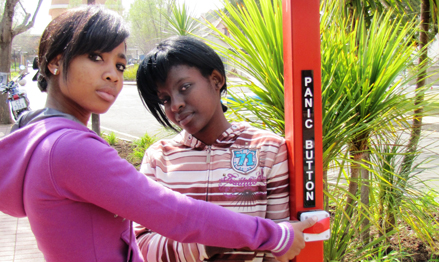Latest News Archive
Please select Category, Year, and then Month to display items
08 April 2021
|
Story Thabo Kessah
|
Photo UFS Photo Archive
 Dr KPD Maphalla with former UFS Chancellor, Dr Franklin Sonn, during the graduations in April 2007.
Dr KPD Maphalla with former UFS Chancellor, Dr Franklin Sonn, during the graduations in April 2007.
The University of the Free State is sad to learn of the passing of alumnus and award-winning Sesotho literary giant, Dr KPD Maphalla.
The literary works of Dr Khotso Pieter David Maphalla, like many other African writers and artists, were influenced and characterised by his own era of powerful forms of oppression and exclusion from dominant literary discourses. In his own right and through his writings of poetry, novels, short stories, and kodiamalla (dirge), he articulated a deliberate political and social protest and pushed for a place for African languages in literature at the height of apartheid.
“He entered the professional scene with his ground-breaking novel, Kabelwamanong, in 1982 at the age of 27. His career actually started in 1971 while he was still at school. Since his first novel, he has produced at least two books annually, covering the genres of poetry, novels, dramas, and short stories. As a dramatist, Dr Maphalla has written a number of excellent and educative radio dramas for the then Radio Sesotho (now Lesedi FM),” said his long-time friend and Head: African Languages at the University of the Free State, Dr Nyefolo Malete.
“It was for this writing prowess that he received recognition from the UFS when he was awarded an Honorary Doctorate in Literature by the Department of African Languages during a momentous ceremony on the Qwaqwa Campus in 2007,” added Dr Malete.
Dr Malete also revealed that, despite losing the use of his right hand after suffering a stroke following a car accident in the late 1990s, Dr Maphalla continued writing using his left hand. “He was adamant that, what he referred to as his ‘supposed disability’, would not deter his passion for writing.”
Dr Maphalla’s work has also produced numerous scholarly studies by the likes of Profs Moleleki Moleleki (protest poetry), Thapelo Selepe (lament and protest poetry), and Dr Seema Seema (process of cross-cultural communication). He was a committed Qwaqwa community member, who was also instrumental in the founding of Qwaqwa Community Radio (2000) and Metjodi Writers (2006), among others. He has written more than 70 books, many of which have been prescribed texts in schools.
Some of the awards he has won include:
South African Centre for Digital Language Resource (SADiLar) Sesotho Lexicographic Unit (Sesiu sa Sesotho) Lifetime Award for outstanding literary works and for promoting Sesotho literature (2019).
The Literature Festival and the University of the Free State Award for enormous contribution to Sesotho literature by a South African writer (2019).
Lifetime Achiever Award in Literature awarded by the Department of Arts and Culture (2005).
M-Net Book Prize for Sesotho poetry (2005). The first and thus far the only Sesotho author to have received this honour.
M-Net Book Prize for best novel (1996).
De Jager-HAUM Literary Award for his volume of short stories, Mohlomong Hosane (1993).
Thomas Mofolo Trophy for Best Novel, Best Poetry, and the Overall Award (1992).
Thomas Mofolo Trophy for Best Poetry (1991).
Dr JJ Moiloa Floating Trophy for Best Sesotho Poetry Book of the Year, Kgapa tsa ka (1985).
UFS a much safer place
2011-09-20
|

|
First-year students Chuma Nyiko (left) and Mabasa Teleni next to one of the red poles installed on our Bloemfontein Campus.
Photo: Amanda Tongha |
Students and staff at our Bloemfontein Campus can feel even safer, with several initiatives being put in place to ensure their safety.
The stop-and-search actions of the recent past, which are being carried out at all the main gates of our Bloemfontein Campus, seem to be successful, since car theft has decreased on the campus. Mr Willie Frankim, Head of Protection Services, says the stop-and-search actions are carried out sporadically, but have a definite effect on crime at the campus. Mr Frankim says only one vehicle has been stolen in the past two months as opposed to the many more that have been stolen in the past.
The message that safety is viewed in a serious light reaches as far as our university’s parking areas and walkways, which are being patrolled by security staff. Mr Frankim says a security officer is placed in all the large parking areas, while other personnel are distributed across the entire campus, especially at key areas, such as at the library and student centre.
Our university also recently installed more than 30 red poles across the entire campus. Each of these red poles is fitted with a panic button by means of which help can be summoned. Should a student or staff member feel unsafe, all they have to do is press the button and cameras, which are installed in the vicinity, will focus on the pole and Protection Services will send assistance. Twenty five of these poles are already working and ten more still have to be activated.
Students and staff can also phone Protection Services on 051 401 2911 if they feel uncomfortable about their safety. They can use this number, for example, to ask a security officer to accompany them to their car.